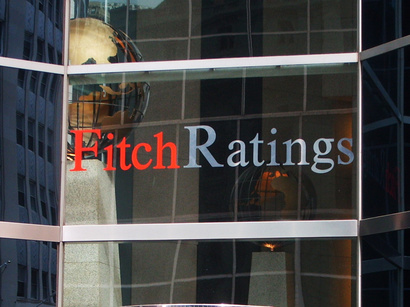ID :
246613
Fri, 07/06/2012 - 17:56
Auther :
Shortlink :
http://m.oananews.org//node/246613
The shortlink copeid
Fitch rates Georgian Railway's new notes 'BB-'

Azerbaijan, Baku, July 6 / Trend /
Fitch Ratings has assigned Georgian Railway JSC's (GR's) USD500m 7.75% notes due 2022 a final foreign currency senior unsecured rating of 'BB-'. This is in line with the expected rating and GR's Long-term foreign and local currency Issuer Default Ratings (IDR) of 'BB-'/Stable Outlook, the agency said on Friday.
The notes rank equally with the existing notes.
Fitch understands that GR has used part of the net proceeds of the notes for a tender offer for the existing USD250m 9.875% notes due 2015 (USD257m representing 89% offer acceptance, premium and accrued interest), to boost funding for its capex (by around USD176m) and to pay dividends in respect of retained earnings (up to GEL102m or USD63m).
The final issue size of the new notes was USD500m, higher than the USD400m first anticipated, however the coupon is below Fitch's conservative assumptions. Importantly for GR's ratings, Fitch forecasts that even with the increased size funds from operations (FFO) adjusted leverage will remain below 3.5x (but above 3.0x) in the short-to-medium term.
The agency takes comfort from the management's assurances that the higher net proceeds will be retained as cash and deposits and not used to further increase dividends from retained profits. The management has also stated that free cash flow (FCF; forecast to be negative due to high capex) and not only net profit (forecast to be significantly positive) will be taken into account when deciding on future dividends. However, in its projections, Fitch assumes future dividends to be paid up to the covenanted level (50% of net profit).
Fitch notes that GR intends to deposit the sizeable liquidity with a number of domestic (and some foreign-controlled) banks, mostly rated 'BB-' or 'BB', to avoid negative carry, and largely in US dollar and Swiss franc to limit FX risk exposure.
Fitch views the extension of GR's debt maturity profile, lowering of its cost of debt and increase in liquidity as credit positives. The intended special dividend payment however is viewed as a sign of a more aggressive and opportunistic financial policy, especially considering the recently extinguished dividend moratorium and intended (but unsuccessful) IPO.
This is despite the strong operational and financial performance of GR which together with the notes provide for adequate funding of the company's sizeable capex (exceeding GEL800m including capitalised interest during 2012-2014).
The notes benefit from covenants including a change of control clause (a loss of control of 50% or more by the government would be a put event - as for the 2015 notes), incurrence leverage test of maximum net debt to EBITDA of 3.5x, restriction on dividends payment at 50% of net profit and a negative pledge.
GR's ratings are supported by its standalone profile which Fitch considers as commensurate with a low 'BB' rating based on the expectation that it will maintain its monopoly status and liberal tariff setting policy, along with a dominant market share in the provision of freight transportation services in Georgia.
The ratings were previously aligned with the sovereign ratings of Georgia ('BB-'/Stable), in accordance with Fitch's parent / subsidiary linkage methodology, reflecting the 100% direct and indirect state ownership, the government backing for its two key investment projects, its importance to the local economy as the largest taxpayer and employer, and its strategic importance as the regional transit corridor.
However, Fitch believes that the transfer of a 25.5% stake in GR from the government to a recently created JSC Partnership Fund ('BB-'/Stable), fully government owned, and in particular the intended special dividend have weakened GR's links with the state. Specifically, the government's tangible support of GR has decreased during a high capex period.
The special dividend effectively pre-pays GR's dividends to the government in lieu of GR's land sale proceeds from the government when Fitch has previously expected a cash payment to be used to amortise debt.
Fitch is therefore likely to separate GR's ratings from the sovereign ratings in case of a sovereign rating upgrade. A negative sovereign rating action would be replicated for GR. A weakening of GR's standalone profile, for example gross lease adjusted debt to FFO leverage above 3.5x, would also be negative for the ratings. While sustained FFO leverage below 1.0x would be positive for the standalone profile, any rating improvement would be capped by the sovereign ratings.
Despite its high EBITDA margin, the company remains highly FCF negative due to large capex plans (the company treats its two large capex projects as discretionary). Fitch anticipates net lease adjusted debt to EBITDAR to average around 2.4x during 2012-2014. This assumes that dividends of up to 50% of net income are paid in 2013 and 2014 and the special dividend is paid in 2012 on top of the GEL28m dividend already paid. FFO leverage is expected at be around 3.2x and FFO interest coverage around 4.5x during this time.
As of 31 May 2012, GR's liquidity remained adequate with GEL61.7m of cash and GEL40.3m of unused facilities (due in 2015 and 2017) with no short-term debt. Fitch forecasts FCF-to-revenue to be negative at around 40% in 2012. The new bond has increase liquidity by around USD176m (or GEL287m).





